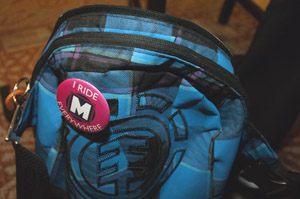St. Louis County voters will decide Tuesday, April 6, whether to pass Proposition A, which calls for a half-cent sales tax increase to support public transportation in the St. Louis area. The increase would provide $75 million annually to expand and operate the Metro system, which includes Metro bus, MetroLink light rail and Call-A-Ride services.
In 1997, St. Louis City voters passed a similar tax, but it will not take effect until the county voters approve the April 6 measure. The city sales tax increase would raise another $8 million for Metro.
For many Washington University students, faculty and staff, Metro provides an environmentally friendly and economical commute to campus, work and social events. Four of the university’s five campuses are served by five MetroLink stations and interconnecting bus routes.
In addition, since 2006, the university has offered a U-Pass — which provides the WUSTL community unlimited rides on Metro bus and MetroLink — free to all full-time, benefits-eligible WUSTL students, faculty and staff. Approximately 18,000 students, faculty and staff participate in the U-Pass program.
“I ride the Metro pretty much every day,” law student Kemi Mustapha says. Mustapha depends on Metro to get to school, perform community service work, meet up with friends and get around St. Louis in general.
Metro also has served as a useful alternative to a personal car for Rachel Amthor, a student at the School of Medicine. Using Metro and traveling with a large group of people has helped her feel more secure during her commute.
“During the winter the Metrobus/MetroLink combination made me feel safe in the early-morning dark as well as in the early-evening dark,” Amthor says. “As a non-native St. Louisan without a car, the Metro allowed me to bridge a gap between home and employment.”
Stephen Beverley, PhD, the Marvin A. Brennecke Professor and head of Molecular Microbiology, gave up his parking spot when MetroLink’s Blue Line was created and rides the train to the School of Medicine every day.
He says he knows of many other WUSTL students and colleagues who have done the same, and he enjoys the sense of community he finds when he rides Metro — not just with other WUSTL employees and students, but also with other St. Louis citizens who ride Metro.
“What I hadn’t anticipated was that if you ride the MetroLink, you also see every element of society — working people, businessmen, families,” Beverly says. “There’s just a great mix of many of the economic classes and ethnic groups present in St. Louis.”
Aaron Welborn, a writer/editor with University Libraries on the Danforth Campus, enjoys the peace of mind that comes from taking Metro to work nearly every day. Riding Metro, he doesn’t have to worry about poor weather or aggressive drivers. It also allows him to better spend time spent traveling to and from work.

Joe Angeles
Many students depend on Metro to get to school, perform community service work, meet up with friends and get around St. Louis in general.
“Usually, I spend that time reading,” Welborn says. “I actually look forward to the commute sometimes because that’s my reading time, and I’ve lost count of the number of books I’ve read just cruising along on my bus and train.
“So for me, riding Metro actually builds time back into my day, time that I can spend doing something I like — instead of fighting traffic,” Welborn says.
Kris Rheinecker, a supervisor with Washington University Dining Services, also spends her commute on Metro reading. She not only uses Metro to travel to and from the Danforth Campus, but she also uses it to get to sporting events downtown and the airport. She says she tries to do whatever she can to “go green.”
“The Metro is a convenient way to travel for me,” Rheinecker says. “I am saving gas, and not sitting in traffic jams.”
While not everyone in our region rides Metro, everyone in the community needs it, Chancellor Mark S. Wrighton says.
“All enterprises in St. Louis have constituencies who depend on public transportation,” Wrighton says. “By supporting public transportation, we have the opportunity to build momentum for all of St. Louis.
“Washington University derives great benefit from the Metro system,” Wrighton says. “Public transportation in St. Louis not only connects Washington University’s campuses to each other, but it also connects Washington University to the St. Louis region.
“I hope that members of the Washington University community who live in St. Louis County will join me in supporting our region’s public transit system and will vote yes on April 6,” Wrighton says.